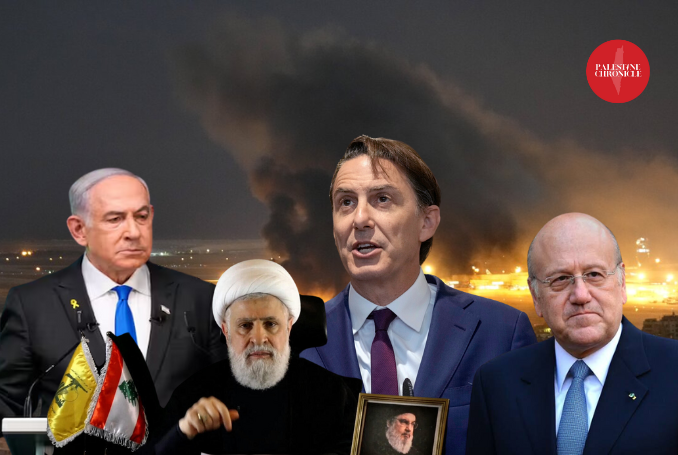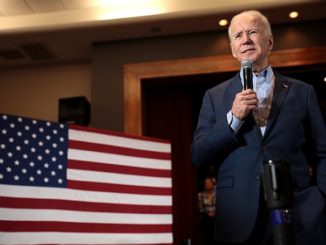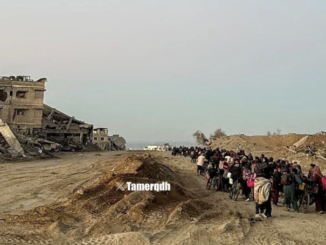
By Jeremy Salt
The Lebanon ceasefire gives Israel temporary relief but Netanyahu never really wanted it, key members of the government are against it and a significant slice of public opinion is actively hostile or doubtful.
We can only wonder what Hassan Nasrallah would have said about this ceasefire. What he did say was that there would be no ceasefire in Lebanon without one in Gaza but one has now been signed to end, at least temporarily, the suffering of the Lebanese people and let Israel off the hook on which it had impaled itself.
Israel launched 20 missile attacks on Beirut in two minutes just before the ceasefire took hold, determined to show the world who is still boss when the facts show that if anyone wanted a ceasefire it was Israel.
In south Lebanon, Israel’s ground offensive against Hezbollah hardly got off the ground. Like 2006, Israeli units were unable to move more than a few kilometers over the 1949 armistice line (the ‘border’). It bombed Lebanese villages but failed to take and hold any of them. The photos of half a dozen soldiers crossing a narrow hand bridge over the Litani River were for propaganda purposes only.
In the weeks after Israel launched its ground assault in early October, Hezbollah killed more than 100 Israeli soldiers in south Lebanon and destroyed dozens of Merkava tanks, while at the same time pounding Israeli military bases and intelligence sites.
It used drones to map out all sensitive sites in Israel, including the naval base at Haifa and the Kirya compound in Tel Aviv, down to the specific rooms the generals and politicians occupy.
It bombed Unit 8200, the cyber intelligence unit. Its drones circling in the skies sent the Israelis scurrying into bomb shelters, while Netanyahu, alarmed at the threat to his own skin, was forced to work underground. Increased attacks on cities caused significant damage.
The ceasefire was brokered by the US and France, born sworn enemies of Hezbollah, with an American-Israeli, Amos Hochstein, a former tank commander in the Israeli military, acting as an intermediary with the government of Lebanon, whose negotiations were largely handled by Nabih Berri, the head of the Amal (Hope) Shia movement and the Speaker of the Parliament.
The agreement strongly favors Israel. Hezbollah and other armed groups are obliged to launch no “offensive actions” against Israel. What is offensive and what is defensive clearly would be an early matter of disagreement. The right of self-defense assigned to Israel and Lebanon raises the same issue.
Israel agrees not to attack targets in Lebanon from land, air, and sea but nothing is said about an end to its tens of thousands of violations of Lebanon’s air space. Both Israel and Lebanon acknowledge UNSC resolution 1701 of 2006, settling the war of that year and obliging Israel and Hezbollah to fully withdraw from the 29 kilometers south of the Litani River. Both never did, Israel claiming that the Shebaa farms was part of Syria’s Golan Heights which it occupied in 1967 and annexed in 1981.
Syria supports the Lebanese case. For strategic reasons, too, Israel refused to withdraw from other districts. With Israel refusing to fully withdraw, Hezbollah remained south of the Litani.
Although it is Hezbollah that has defended Lebanon since the 1980s, taking on the role of a national army, only the Lebanese military and security forces are authorized in the ceasefire agreement to carry arms south of the Litani.
The Lebanese government is committed to preventing Hezbollah and all armed groups from carrying out attacks on Israel. It will also regulate and control the production of arms and any sale of arms or related material into Lebanon.
Lebanon will provide “all necessary authorities” (no definition of who they are) with the freedom of movement [and access] to Lebanon’s official military and security forces and instruct them to:
- To monitor and “enforce against” any unauthorized entry of arms or related material into Lebanon, including through border crossings and against the production of unauthorized production of arms and related material within Lebanon
- Dismantle all unauthorized arms production facilities, “starting with the southern Litani area.”
- Dismantle all infrastructure and military positions and confiscate all unauthorized arms, “starting with the southern Litani area.”
The US and France will work with the Military Technical Committee for Lebanon to enable and achieve a total LAF (Lebanese Armed Forces) deployment of 10,000 soldiers in southern Lebanon. The US and France will also work with France to increase its deployment levels “and improve its capabilities.”
Israel and Lebanon resolve to enhance the ‘tripartite mechanism’ (Lebanon, Israel and UNIFIL) in coordination with UNIFIL. “Hosted” by UNIFIL and chaired by the US and [others], including France it will monitor, verify and assist in enforcing the commitments made by Israel and Lebanon.
This ‘mechanism’ will work with the MTC4L (the military-technical committee for Lebanon) to strengthen the training and capacity of the Lebanese armed forces to “inspect and dismantle unauthorized sites and infrastructure above and below the ground, confiscate weapons and prevent the presence of unauthorized groups.
The Israeli withdrawal from southern Lebanon and the redeployment there of the Lebanese military should not exceed 60 days. The partner countries of MTC4L are Italy, the US, Canada, the UK, France, Germany, Spain and the Netherlands. The US will ‘enhance’ direct negotiations between Israel and Lebanon to delineate an internationally-recognized land border.
According to Israeli reports, Israel has also received a ‘side letter’ from the US recognizing Israel’s ‘right’ to retaliate and continue the violations of Lebanon’s air space with reconnaissance flights. There is naturally no mention of any ‘right’ by Lebanon to violate Israeli air space.
This agreement has the hands of the US, the UK and European governments all over it and in this respect, it resembles all the settlements forced on Lebanon, Syria and the Middle East in general since the 19th century.
In line with western attacks or western-backed attacks on sovereign Ottoman territory before 1914, Lebanon’s sovereign rights as an independent state are not even up for discussion. The ceasefire is an imperial package, broadly geared to meeting Israeli/western demands, beginning with the destruction of Hezbollah.
The Jerusalem Post welcomed the ceasefire because it “gives Israel the opportunity to address broader threats without overextending military and political resources” which, of course, are already overextended.
The ‘broader threats’ Israel now intends to address basically come down to one: Iran. Netanyahu said the ceasefire would give Israel time to replenish stocks of arms and military equipment and allow it to focus on the Iranian “threat” while weakening Hezbollah and isolating Hamas.
Favorable to Israel, the ceasefire is still not favorable enough for Israelis. While opinion on the Lebanese and Arab sides on the wisdom of signing on to this agreement is divided, opposition in Israel is widespread, from displaced settlers to members of the government coalition. Itamar Ben Gvir calls the ceasefire “a grave mistake” and Bezalel Smotrich “not worth the paper it is written on.” Opposition leader Benny Gantz and leading public figures are against it.
Although calls are now being made for the ceasefire to be followed by one in Gaza this is not at all likely. What used to be called the ‘settler lobby’ until it grew into the mainspring of the Netanyahu government is determined to settle Gaza and has not given up on taking southern Lebanon down to the Litani River as well.
The Lebanon ceasefire is not one Israel wanted but one that Netanyahu was forced to accept by a deteriorating internal situation socially, politically and economically and by his failure after more than a year to defeat Hamas and Hezbollah and secure the release of Israeli citizens held captive in Gaza.
It is naturally a ceasefire desperately needed in Lebanon by the hundreds of thousands of civilians terrorized and displaced by Israeli air attacks on their cities, towns and villages.
With Israel failing to defeat it, Hezbollah is claiming victory. There is merit in this as Hezbollah is a resistance movement and Israel has what used to be regarded as one of the strongest armies in the world.
The ceasefire almost seems designed to fail. The Lebanese government and military are not capable of doing what is being demanded of them, even with the Americans, the British and the Europeans pushing from behind. Lebanon has not even had a president since 2022, yet no law can be ratified without the president’s consent.
Paralysis grips the parliament, and the economic situation was already close to catastrophic before the Israeli attack. The World Bank estimated in November 2024 that Israel’s war has done $8.5 billion in damage, $3.4 billion just in physical destruction. 875,000 people have been internally displaced (other figures go as high as $1.5 million),166,000 people have lost their jobs and $168 million in earnings. 100,000 housing units have been destroyed wholly or partially to the tune of $3.2 billion in damage.
Unemployment is running at 50 percent, GDP is expected to decrease by 6-8 percent and inflation rose to 253.55 percent in June 2023 before declining to 221 percent, 177.25 percent in January 2024, before dollarization and stabilization of the exchange rate pushed it down 41.78 percent in June and to the current 32.9 percent.
On top of all this, Lebanon remains a confessional state, with historically deep political, social, religious and economic divisions cemented into the political, bureaucratic and military order.
Hezbollah has strong enemies. It is too much to say that no Lebanese want to return to the truly vicious civil war of the 1970s because some would run that risk. In this environment, the Lebanese government has signed the ceasefire but almost certainly does not have the capacity to enforce it. Even the attempt could plunge Lebanon back into the chaos of the civil war.
As always the US is fighting from Israel’s corner. It has intervened in Lebanon since sending the Sixth Fleet to Beirut during the civil war in 1958 to protect the west’s man in Lebanon, the beleaguered president Camille Chamoun. In 1985 a CIA-linked cell tried to assassinate the Shia and Hezbollah cleric Muhammad Hussein Fadlallah, failing but killing 80 other people in a car bombing.
The US supported the Israeli invasion of 1982 until Israel went too far with the Sabra and Shatila massacres. In 2006 it held the gates open for another Israeli invasion and now it is supplying the arms that enable Israel to continue the Gaza genocide.
Through the ceasefire, it is now intent on turning the Lebanese army into a puppet army and Lebanon into a puppet state that will abandon the resistance and eventually enter into ‘normal’ relations with Israel, a goal Israel and its western backers have intermittently tried but failed to reach ever since 1948.
Reaching for a “tool of first resort”, as officials have described it, in the past 20 years the US has put more than 270 individuals and organizations on its Lebanon sanctions list. Many are accused of corruption but 68 percent are Hezbollah members and affiliates described as “specially designated global terrorists.”
They include Al Manar TV and people who “knowingly provide significant financial material or technical support for Hezbollah and any of its affiliates, including Jihad al Bina construction company, Al Manar TV and Nour Radio.” Two Hezbollah members of parliament plus one from the Amal movement are also on the list.
As Hezbollah is a major source of health and social welfare provisions, the sanctions damage the lives of many Lebanese. In addition, the US is directing Syria-related sanctions against individuals accused of “undermining Lebanese sovereignty.” The purpose of these ‘terrorist-related’ sanctions is not to strengthen Lebanon but to divide and weaken it in the confrontation with Israel.
In Gaza, Israel is mostly fighting Hamas and PIJ from the air, with the same ‘achievements’ of its military in Lebanon, by massacring civilians but failing to suppress the resistance. It is losing soldiers, tanks, troop carriers and D9 bulldozers virtually every day. Jabaliya has been under siege since the beginning of October but even there Israel has failed to break armed resistance as well as the will of the people. Even Israel’s own military observers say Hamas has not been defeated and will not be.
Calls for a Gaza ceasefire coming from outside will not be heeded. Netanyahu does not want a Gaza ceasefire any more than the so-called settler lobby. While rapidly increasing settlement on the West Bank, it is looking ahead to resettling Gaza as well.
In fact, the lobby is part of the government and any distinction between Netanyahu and the settler movement would be false.
Netanyahu himself is a territorial maximalist. As prime minister he cannot afford to be as open as Ben Gvir and Smotrich but he brought them into government, gave them control of the West Bank and is cut from the same fanatical cloth. Nothing can be expected from them but more violence as they press ahead with their hubristic plans to bend the entire Middle East to their will.
The Lebanon ceasefire gives Israel temporary relief but Netanyahu never really wanted it, key members of the government are against it and a significant slice of public opinion is actively hostile or doubtful.
Taking everything into account, the ceasefire could break down at any time. It would be surprising if it lasted for 60 days, let alone led to Biden’s “permanent cessation of hostilities.”

– Jeremy Salt taught at the University of Melbourne, at Bosporus University in Istanbul and Bilkent University in Ankara for many years, specializing in the modern history of the Middle East. Among his recent publications is his 2008 book, The Unmaking of the Middle East. A History of Western Disorder in Arab Lands (University of California Press) and The Last Ottoman Wars. The Human Cost 1877-1923 (University of Utah Press, 2019). He contributed this article to The Palestine Chronicle.








Since the ceasefire violates that primary clause of the UN Charter, Article 2 1. “The Organization is based on the principle of the sovereign equality of all its Members.” is bound to be broken. The IDF will swear black and blue that its bombing of the Lebanese hospitals and parliamentary buildings and port were purely defensive, the US in a spurt of suicidal self-hate will support the IDF, and nobody will pay either Israel or the US any attention. It means the prolonged death of the “Washington Consensus” in the Middle East, but it also guarantees its death. “All Animals Are Equal, But Some Are More Equal Than Others.”